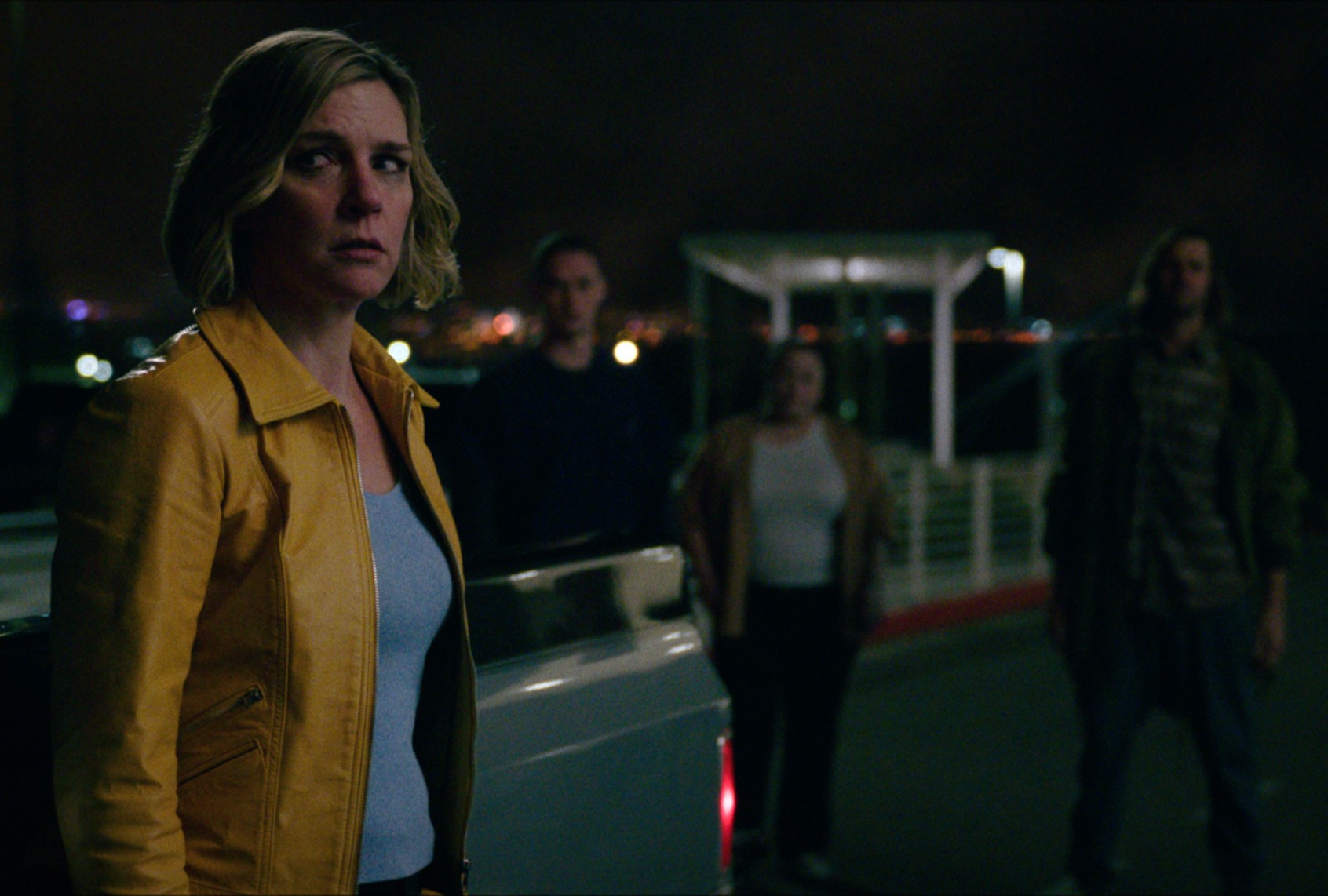With “Pluribus,” Vince Gilligan has what most series creators would envy: a show that generates constantly evolving conversation. Those who watch are careful about spoilers, often refusing to discuss the show with anyone who hasn’t seen it yet.
Once a viewer is indoctrinated, however, they may find it difficult to refrain from puzzling over its message. Is it a parable about the dangers posed by artificial intelligence and the fawning tendencies of large language models? That we can answer with a firm “No,” since Gilligan said as much in several interviews, including a recent Variety profile. When he first conceived of the show nearly a decade ago, ChatGPT didn’t exist.
Perhaps it’s one long defense of being a hater, as a Forbes story published a few weeks ago posits. Or maybe hatred is the cure.
Theories abound on social media, especially (and of course) on Reddit. Clicking on a message board can send you down a rabbit hole for hours. Yet no one can say they’ve decisively decoded what the show is trying to tell us. In this, “Pluribus” shares similarities with the story’s inciting event, which I could describe here but won’t. It’s better for you to see it firsthand.

(Apple TV) Rhea Seehorn in “Pluribus”
Gilligan’s establishing story transmits much more clearly than what happens after the sudden realignment of civilization, unifying almost every living person in the world around the singular purpose of pleasing Earth’s most cynical, miserable person, romance fantasy author Carol Sturka (Rhea Seehorn).
Moments before a cosmic event leaves Carol and 12 others alone in retaining their free will, she expresses resentment for being trapped in a cycle of incredible success. Her Wycaro book series, about a pirate — sorry, a corsair — named Raban, whose ship sails on purple sands, enthralls millions and has made Carol and her manager/life partner Helen (Miriam Shor) comfortably wealthy. But when she’s not signing books for her faithful readers, Carol glumly disparages her jackpot premise as if it’s a badly written “Star Trek” episode.
While sipping drinks at a cowboy bar, Helen wonders what it will take for Carol to be content at long last. Then fate asks that question on a grand scale by suddenly uniting billions into a single, blissed-out hivemind, an event they call the Joining. In comingling everyone’s knowledge and expertise, including that of the hundreds of millions who don’t survive the changeover, the new, singularly minded human race operates under the firm belief that it has found true happiness.
Thus, Carol suddenly finds herself alone in a crowd of strangers who think they know her better than she knows herself.
Science fiction bursts at the seams with bizarre extinction scenarios, usually delivered from space, like the one that precipitates Carol’s irritating life turn. Setting Gilligan’s apart from zombie or alien takeovers is that his hivemind is genuinely uninterested in harming those unaffected by the transformation. In fact, they immediately set themselves on the task of pleasing Carol and those like her, along with solving the riddle of their immunity, so they can absorb the stragglers into their joy amoeba.
Carol presumes that everyone else who still has their agency is as set on finding a way to reverse this mass delusion as she is. But many are satisfied with this new, uniformly loving world. One woman named Laxmi (Menik Gooneratne) disagrees with Carol’s assumption that what’s happened is wrong, since she has her son and family at her side and wants nothing more than that.
As is true of most great inventions, popular culture’s most effective Rorschach tests are entirely accidental, whereas the most meticulously planned weirdness tends to flop hardest.
Prestige TV has produced its share of narratively-driven psychological experimentation, most of it unintentional, but little of it as audacious as “Pluribus.” Gilligan might find that declaration a bit hyperbolic, especially in light of what other shows have done. “The Sopranos,” still considered to be one of the greatest TV dramas ever written, sustained a 14-year debate over the significance of the 2007 finale’s abrupt cut to black. David Chase refused to definitively settle that argument until 2021 — or 2018, for those close readers of “The Sopranos Sessions” who noticed the “Sopranos” creator describe that moment in a certain way.

(Apple TV) Karolina Wydra and Samba Schutte in “Pluribus”
Even when Chase finally explained what he meant to convey, he also admitted surprise that his intent wasn’t universally understood. As is true of most great inventions, popular culture’s most effective Rorschach tests are entirely accidental, whereas the most meticulously planned weirdness tends to flop hardest. Not always, of course; we’ll always have “Lost.” And we’ll always argue over its conclusion.
Projecting individual meaning onto our favorite shows is a natural result of an emotionally freighted medium. That means once you made peace with a favorite show’s version of a “Sopranos” blackout, whatever impression you hold to be true is as valid as the creators’ intent. All artists send their visions into the world without knowing whether viewers will find them, or how they’ll interpret what they’re seeing. If people are talking about a show like “Pluribus,” that’s enough.
As we debate TV’s continued relevance in our social media-driven attention economy, generating any level of sustained intellectual interest is difficult. That “Pluribus” comes from Gilligan, the mind behind “Breaking Bad” and “Better Call Saul,” is only shocking to anyone who memory-holed his years spent working on “The X-Files” and its short-running spinoff, “The Lone Gunmen.”
While Gilligan cut his speculative storytelling teeth by writing out-there adventures for Fox Mulder and Dana Scully, those were one-and-done affairs shepherded by characters with investigative expertise. But it is the consistency of Mulder and Scully’s partnership that places “The X-Files” among genre TV’s greatest forces. No matter the curious case, their balance of vast belief and arch skepticism sparked questions about the nature of human existence.
Seehorn’s Carol, on the other hand, is battling her way through one long X-File that, for the time being, is set to play out over at least two seasons.
We need your help to stay independent
When the hivemind grows concerned about her loneliness — Helen is one of the more than 866 million who didn’t survive the cataclysm — it provides her with a “concierge” named Zosia (Karolina Wydra), chosen for her resemblance to the romantic hero of Carol’s novels. And Zosia is a being of infinite patience, willing to provide Carol with anything she asks, including an explosive. Guess how that turns out.
Before its early November premiere, Gilligan told Time magazine that “Pluribus” sprang from a simple question. “I thought: What if everyone in the world got along? And, specifically, what if everyone in the world was suddenly really, really nice to me personally?” he mused.
Gilligan also created “Pluribus” as a counterweight to the antihero era he helped define by contributing two unforgettable linchpins, Walter White and Saul Goodman. Three, actually, if you count Seehorn’s Kim Wexler, Saul Goodman’s better half in the “Breaking Bad” spinoff “Better Call Saul.”

(Apple TV) Karolina Wydra in “Pluribus”
The high regard that audiences held for Kim translates without much of a challenge to Carol, an entirely different character who nevertheless shares shades of Kim’s frustration with the way the world works. But unlike Walter and Saul, Carol isn’t a champion of our darkest id. We’re a lot like her already, making the first five episodes feel like a sideways glance into some version of a reflection.
Carol is still confronting the limits and effects of her god-level power. She learns pretty quickly that her angry emotional outbursts can cause the hivemind to collapse, killing millions, or that physically harming one causes all of them to weep and plead for mercy in unison. As one can imagine, this does nothing to endear Carol to Laxmi.
As “Pluribus” charges forward, it invites us to ask ourselves whether it’s better to surrender everything to some nebulous idea of world peace or retain those personal freedoms that Americans claim to hold dear.
An enlightening, powerful scene in a recent episode, however, explains why Carol is entitled to her violent distrust. She reveals that her parents responded to her coming out as queer by forcing her to undergo conversion therapy. Carol recalled that its facilitators were some of the worst people she’s ever known, “and they smiled all the time, just like you,” she tells one of them.
Then again, Gilligan writes plenty of arguments against returning to life as we know it, mainly spoken through a Mauritanian named Koumba Diabaté (Samba Schutte), who responds to his unique position post-Joining by diving into a life guided by hedonistic joie de vivre.
But we’ve also just met Koumba’s opposite, a Paraguayan man named Manousos Oviedo (Carlos-Manuel Vesga) who’s even less trusting of the Nice World Order than Carol. Manousos has barricaded himself inside the storage facility he manages, refusing to interact with anyone, even Carol, whose phone calls he refuses.
Surely there’s compromise to be had between these extremes. Koumba points out to Carol that in exchange for everyone’s loss of individuality, there is no crime, racism or want. The hivemind refuses to hurt or kill any living being, states its preference for vegetarianism and merrily labors to care for the few who aren’t like them. What’s wrong with that?
Just remember that we’re only halfway through the introduction to this post-apocalypse, with rules and borders that Carol is only beginning to figure out. In the fourth episode, for example, she learned that the hivemind can’t lie, but individuals will nearly die to prevent people like her from pulling truths from them that endanger their biological imperative to assimilate the immune. But even that isn’t an evil goal in their view; as Zosia lovingly points out, Carol is so busy defending her right to remain as she is that she never even considers what it’s like to be them.
Want more from culture than just the latest trend? The Swell highlights art made to last.
Sign up here
As “Pluribus” charges forward, the constant, obvious question it invites us to ask ourselves is whether it’s better to surrender everything to some nebulous idea of world peace or retain those personal freedoms (and the associated conflicts defending them can create) that Americans claim to hold so dear.
In several interviews released before “Pluribus” debuted, Gilligan repeats an insistence common to storytellers whose work happens to meet the prevailing sentiments of a specific moment. That is, he says he only wants to tell a good story and do it well. Gilligan also steers clear of political commentary in his other work. Carol’s odyssey doesn’t break that rule.
Nevertheless, our compulsion to glean some broader significance from Carol’s story cannot help but wander into that territory. “Pluribus” may be the only Latin most Americans are familiar with, assuming they ever looked closely at a coin; it’s the “many” portion of the unofficial American motto that translates to “Out of many, one.”
Current events make us question whether those words are true anymore. America is supposedly riven by a binary tribalism, although its opposing teams are unable to coordinate around a productive purpose.

(Apple TV) Rhea Seehorn in “Pluribus”
Factions calling for unity are answered by those questioning how the people demanding it define that word. One party insists on assimilation, while its opposite is devoted to inclusion and resistance. No matter where you sit on these spectrums, there’s a strain within “Pluribus” that speaks directly to your feelings, much like the disembodied voices on Carol’s phone that cheerily ask her what she needs whenever she picks up her handset.
But there’s also relief in not exactly knowing what’s going on and placing complete trust in Gilligan’s sure-footed storytelling. Critics were given seven episodes to preview out of the first season’s nine installments, enough to confirm that any emerging theories about its meaning can only be half-baked.
For the record, I don’t have one to share beyond noting how Carol’s plight highlights our species’ natural talent for self-destruction. That isn’t really a spoiler since that statement could apply to anyone “Pluribus” has introduced so far, although it takes on new significance after Episode 5. I’d love to say more. But first, you should watch the show. Maybe after that, we can talk.
The fifth episode of “Pluribus” premieres Wednesday, Nov. 26 on Apple TV. New episodes debut on Fridays.
Read more
about Vince Gilligan’s shows


